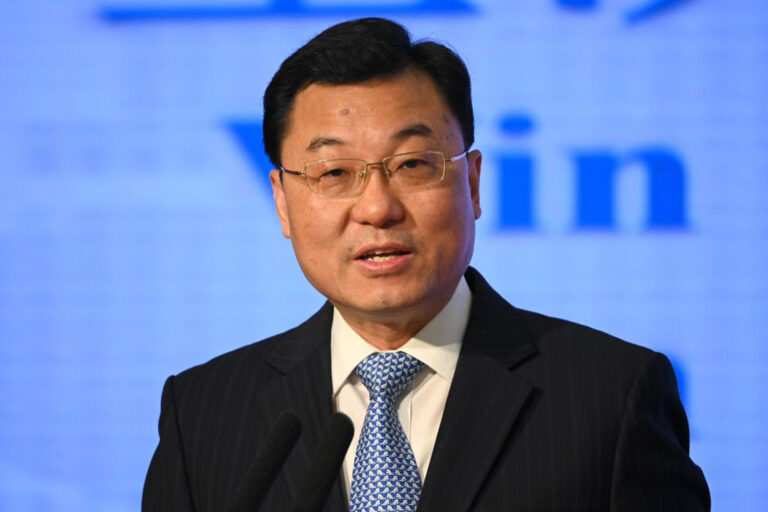
China’s new ambassador to the U.S. said the relationship between the world’s two biggest economies is facing “serious difficulties and challenges.”
“We hope the United States will work together with China to increase dialogue, to manage differences and also to expand our cooperation,” Xie Feng said after his arrival at John F. Kennedy International Airport in New York on Tuesday.
Xie, who earlier in his career had served in several roles at the embassy in Washington and was Beijing’s top representative in Hong Kong, fills a key post that had been vacant for five months. His predecessor, Qin Gang, left in early January after being promoted to foreign minister.
The appointment comes as Washington aims to stabilize ties between the two global competitors. Relations were derailed in recent months amid disputes over spying allegations, Taiwan’s sovereignty and U.S. technology export controls.
During his brief remarks Tuesday, Xie said he intended to “engage extensively” with Americans and learn about the country, as well as “properly handling sensitive and important issues, like the Taiwan question.”
The relationship remains on edge thanks to Washington’s aggressive efforts to curb China’s technology ambitions, which includes banning the sale of semiconductor equipment. Beijing showed its limited ability to retaliate by targeting imports of Micron Technology Inc., a memory chip company that is relatively easy for China to replace.
President Joe Biden voiced optimism Sunday at the close of the Group of Seven summit that relations would “thaw very shortly.” That message was mixed with a G-7 resolution to fight what it called China’s “economic coercion,” while officials in Beijing said they questioned Biden’s “sincerity.”
U.S. National Security Adviser Jake Sullivan met China’s top diplomat Wang Yi in Vienna earlier this month, while China’s Commerce minister Wang Wentao is scheduled to meet this week with both U.S. Commerce Secretary Gina Raimondo in Washington and U.S. Trade Representative Katherine Tai in Detroit.
Top support
Xie’s career path signals he has the trust of the country’s President Xi Jinping.
Xie, 59, was serving in Hong Kong in 2019 when the city was beset by historic and sometimes violent protests. At a forum that year, he said “the true motive of the opposition in Hong Kong and the foreign forces behind them is to mess up the city, overthrow the legitimate government.”
The “fighting spirit” Xie displayed in the former British colony won him the approval of senior leaders in Beijing, helping advance his career, the Sing Tao Daily reported in 2021, just before Xie was promoted to vice foreign minister.
“Xie is a veteran of the Foreign Ministry whose promotion likely owes to his ability to adjust his work to reflect the shifting demands of China’s top leadership,” Neil Thomas, a fellow at the Asia Society Policy Institute’s Center for China Analysis, said before Xie was named to the post. “When Xi wants him to be pragmatic, Xie will be pragmatic. When Xi wants him to be aggressive, Xie will be aggressive,” he said.
In his most recent post, as vice foreign minister, Xie has met with several representatives from U.S. companies and groups, including Ford Moto Co.’s chief policy officer and general counsel Steven Croley and Blackstone Chief Executive Officer Steve Schwarzman, as well from the National Committee on U.S.-China Relations and The Julliard School, according to the ministry’s website.
Xie is also a vice director of a research center dedicated to Xi’s thinking on how diplomacy should be handled. On Oct. 14, he gave a “lecture” to the nation of 1.4 billion people on state broadcaster China Central Television that focused on “Xi diplomacy,” saying its ultimate aim was to care for the people.
Xie was also involved in negotiating a deal that led to China releasing two Canadian citizens and the return of Huawei Technologies Co. executive Meng Wanzhou to Beijing, according to the Wall Street Journal.
___
© 2023 Bloomberg L.P
Distributed by Tribune Content Agency, LLC.
0 comments :
Post a Comment